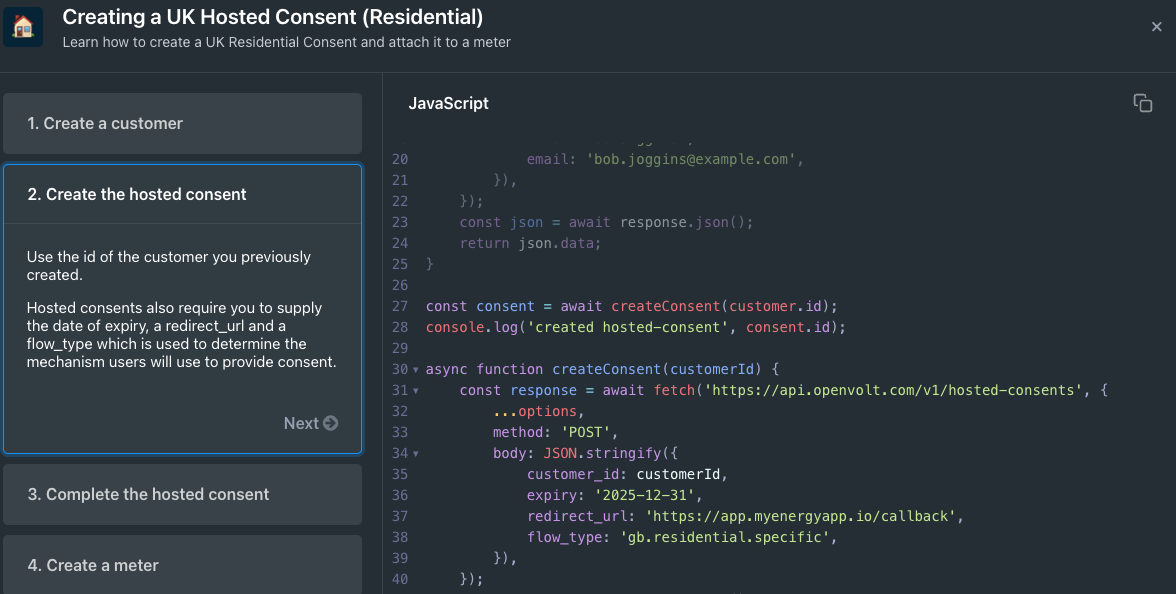Announcing access to UK Residential Smart Meters

Aleksandar Ilic
Product Engineer
With a smart or advanced meter penetration of over 60%, the UK now has over 35M of these meters deployed in the country. The vast majority of these meters are connected to the Smart DCC network, a government appointed entity tasked with ensuring the flow of data from the smart meters to industry participants such as energy retailers. Today we’re excited to announce that those meters can now be accessed through the Openvolt API.
This is a key unlock. The UK also has one of the most dynamic energy markets in Europe and, coupled with a vibrant ecosystem of startups building applications to tackle the energy transition, this new data source from Openvolt can help power those energy innovators to deliver new and exciting applications to their customers.

As we expand access to smart meters across Europe, one challenge that we’re tackling head on is ensuring that not only do we build the connectors into these central data sources, but that we also equip app developers with the workflows needed to secure the appropriate consent from their users to access their smart meter data. Each country and type of meter (residential or commercial) has a different set of consent requirements when accessing and storing customer data. Along with the connection into Smart DCC, we are also announcing the launch of Hosted Consents for the UK residential market. This means that Openvolt will take care of all the heavy lifting when it comes to collecting the correct set of consent information from your customer, regardless of country or meter type, with mobile optimized workflows and customizable branding.
Once we have received a valid consent from your app user, we will then be able to retrieve their half hourly electricity consumption data for the past 13 months and make this data available to you (either through our API or via webhook notifications). You can then focus on what you do best - building a great app experience for your customers!
To read more about UK Smart Meter connections and hosted consent, please read our developer guide
Other Updates
Added
- UK Commercial Smart Meters will now only collect data if it has a valid hosted consent, you can check whether or not your meter is valid by looking at the
validproperty when fetching a meter. - Added
meter.enabledto meters, this can be used to enable/disable meter programatically by developers and replaces an oldermeter.validity_state.is_disabled_by_userproperty. - Added
meter.error_code. Initially this property will benullbut in the coming weeks we'll be adding support for helping you to diagnose what has happened when we were not able to collect smart meter data. We will be providing more information on these error codes in the coming weeks. - Improved internal audit trail when changing a hosted consent on a meter.
Removed
- Evidence files for hosted consent have been removed from being returned on the hosted consent object. The reason for this change was that in cases where you might query for hundreds of meters, if an evidence file was particularly large this would massively increase the side of a request.
- To access the evidence for a hosted consent there is a new endpoint you can call:
/v1/hosted-consents/:id/evidences
- To access the evidence for a hosted consent there is a new endpoint you can call:
Deprecated
- To try and reduce duplication of information, the
meter.validity_stateproperty has been deprecated and will be removed in the second half of the year (not date set yet). Validity states will continue to be returned for any new meters, but we would encourage you to use other available properties on the meter to ensure your code will continue to work correctly.meter.validity_state.missing_consent-> checkmeter.hosted_consentdirectlymeter.validity_state.expired_consent-> check ifvalidonmeter.hosted_consentdirectlymeter.validity_state.is_disabled_by_user-> checkmeter.enableddirectlymeter.validity_state.has_invalid_meter_number-> checkmeter.error_codedirectly
Changed
- Improve some status code responses to make them more reflective of the error (for example 422 on validation errors)
- The
meter.statusproperty is no longer stored in our database, but virtually calculated frommeter.enabledandmeter.validwhich is to say, for a meter to beactiveit must be bothvalidandenabledby the user. - the
/metersendpoint has had a few query parameters added and some taken away due to the above changes. You will no longer be able to query by anyvalidity_stateproperties, but you will be able to query by these additional ones:enablederror_code
- The
logoproperty on account objects no longer contains the raw file data in order to reduce the size of api responses. This field will now contain a URL that can be called to retrieve this file data directly.
Fixed
- Fixed an issue where, In rare cases, calling the API with invalid credentials may result in the request "hanging".
- Webhook triggers should no longer be called if no data was received for a smart meter when being checked by Openvolt.
- Fixed an issue whereby if adding a meter number that already exists on the platform we would not backfill the new meters data.
